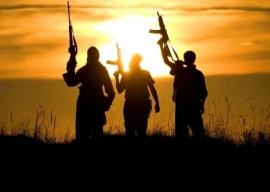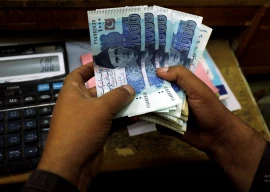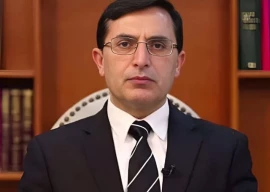Rape is euphemistically called ‘a fate worse than death’ but those who’ve suffered this horrific trauma need a way to move forward with their lives. When the worst happens, know what recourse you have.
Last year, Pakistani television viewers watched Geo TV’s drama Mora Piya in horror as the heroine, a new bride, was raped by a goon soon after her wedding.
Ujala and her husband decide to keep quiet about the incident, but Ujala’s misery is heart-wrenching — she jumps with fright when her husband hands her clothes, screams after waking from a nightmare, and sobs after seeing her father.
The rape becomes a central point in the drama’s plot, and viewers watch Ujala as she attempts to move forward with her life, a slow, fraught process.
Despite the taboo, it’s no secret that acts of sexual violence take place every day. The Human Rights Commission of Pakistan estimates a rape occurs every two hours and a gang rape every eight hours.
According to an Aurat Foundation report, there were 4,069 incidents of violence against women in Pakistan in 2010, a number that seems to be increasing.
War Against Rape reported that there has been an eight per cent increase in the number of registered cases of sexual violence in the last year.
Though Ujala and her husband decided to keep the rape a secret, victims do have other options. Here’s what you should know if someone you know has been a victim of sexual violence.
1- Get her to a safe place
It’s important to get the victim away from the perpetrator, to a safe place.
2- Get her medical attention
It’s imperative that victims of sexual assault get medical attention as soon as possible, says Rukhsana Siddiqi, head of War Against Rape’s Survivor Support department. If she thinks that she wants to press charges, make sure you get her to a medico-legal officer who can also collect forensic evidence, a crucial factor if she decides to contact local authorities.
You don’t have to make her go see a medico-legal officer right away. Medical professionals can check for possible injuries, as well as for sexually-transmitted diseases, and give her the information necessary to prevent pregnancy. Encourage her to see a doctor she feels comfortable with. If she’s most comfortable calling her khala, who’s a doctor, do that instead.
3- Help her decide whether she wants to report the crime
In order to report an instance of rape in Pakistan, the victim has to file a First Information Report (FIR) at a police station.
Filing an FIR is a complicated process — and needs to be done correctly in order for police and lawyers to prosecute the case. Remind your friend that she can use the resources of non-profits and NGOs like WAR to place pressure on police to follow-up on the crime. You can also reach out to your local CPLC office for help and advice.
A rape victim needs to be examined by a medico-legal officer immediately after the assault. The medico-legal officer will collect physical evidence of the sexual assault and question her on the details.
Going to a medico-legal officer at this stage may be difficult for the rape victim but collecting this forensic evidence is necessary since she may want to report the crime later on.
Remember, reporting the crime without having collected the forensic evidence would not only be pointless, it might actually land the rape victim in trouble as her complaint may be construed as an admission of fornication.
Once the evidence has been collected, the victim of sexual assault has the option of reporting the crime, or not, as she sees fit. By seeing a medico-legal officer she keeps her options open.
Here’s what WAR recommends: Take the clothes that she was wearing. Make sure she avoids bathing, urinating, or doing anything that could jeopardise evidence against the perpetrator.
Unfortunately, not every government hospital has medico-legal officers who can examine rape victims—MLOs are transferred to other hospitals in the province based on need. Check to see which hospitals in your city or area are actively processing rape cases at the time.
In Karachi, WAR can assist you with this process. Private hospitals usually do not have medico-legal officers, and are rarely able to use their examinations as evidence in prosecutions.Remind her that she doesn’t have to file an FIR immediately after being examined by a medical professional.
If the evidence has been collected, it can be used later to catch the perpetrator. Other things to keep in mind: Have the police officer read the FIR out loud to you, so that you can make sure that all of the facts have been recorded correctly. Take a brother or father with you to the police station to make sure that the FIR is lodged in the proper place.
It’s not necessary for the person who has been raped to file the FIR, as long as the person filing the report can relay all of the details.
Here’s the most important thing to remember: If the victim wishes to press charges, make sure that she requests a copy of the FIR report, and checks to see that it’s filed under Zina-bil-Jabr, and not under Zina. The latter means that she could be charged with adultery instead of rape.
However, according to WAR, often women do not report rape to authorities — let your friend know that choosing not to prosecute the crime is okay as well.
“The criminal justice system and the police in our society are not trained or sensitised towards the problem and prevalence of rape in Pakistan,” explains Siddiqi. Women do not want to share their personal trauma and intricate details with men and the paucity of women police stations adds to their hesitation in reporting the crime.
Even when women do press charges, the reality is that even after fighting for years, most do not get justice, says Aasia Munir, the in-house lawyer for WAR.
4- Let her know that what happened is not her fault
Often, victims feel as though they are the ones responsible for rape and sexual assault, especially in Pakistan, where women are blamed for bringing it upon themselves. Regardless of what your friend was wearing or doing, it’s important for you to remind her that she is not responsible.
5- Encourage her to seek help, but recognise that healing takes time
Being the victim of a violent crime can cause immense physical, psychological and emotional upheavals and it is important for you to remind your friend that she is not alone.
Make sure that you’re available to listen to your friend whenever she needs. Be patient; rape and sexual violence are crimes that render their victims powerless, and it is important not to add to their feelings of helplessness by pressuring her to do something she’s not ready to yet.
Keep in mind that it’s not just the victim that needs counselling. According to WAR, counselling is vital for the family as well. “These families suffer from persecution and are ostracised by neighbours,” Siddiqi explained. “They also need to rehabilitate themselves back in society and they need to understand the plight of the victim in order to give her support.”
However, there is still stigma attached to seeking psychiatric help. “Fortunately, people are becoming more aware of the significance of such therapy which helps rape victims immensely, and there are many who get jobs and start leading relatively normal lives,” said Siddiqi. “It is important that you talk about the horrifying experience instead of bottling it up — even if it means just talking to a close friend or family member.”
If she’s unable to see a psychologist about her trauma, point her in the direction of NGOs like WAR, who make counselling available for rape survivors, or toward online support groups who will respect her anonymity.
Where to turn to for help
War Against Rape:
Provides legal assistance to victims of rape, gang-rape, attempted rape, incest and male rape.
Tel: +92 21 35373008
The Panah Shelter home:
Gives aid and shelter to women as well as medical and psychiatric counselling and therapy.
Tel: +92 21 36360025, 36360028
Aurat Foundation:
Connects women to lawyers, shelters, and offers legal aid and sensitisation training.
Karachi: +92 21 35824694
Lahore: +92 42 35959027-9
Islamabad: +92 51 2608956-8
APWA Legal Aid Call Centre:
Provides a helpline that helps you find advocates who fight against violence against women. Tel: +92 21 32225854
Madadgaar helpline:
Serves as the first point of contact for victims of violence, abuse and exploitation through guidance and referrals.
Tel: +92 21 111-911-922
Published in The Express Tribune, Ms T, September 9th, 2012.
Like MsT on Facebook for your dose of girl talk
COMMENTS (20)
Comments are moderated and generally will be posted if they are on-topic and not abusive.
For more information, please see our Comments FAQ

















@Vikram: "I have never heard about a Muslim women (with or without hijab) being raped in USA." They're not only raped in the west itself but raped in their own countries by soldiers in western occupied countries. What about Bosnia? Hell, what about Indian Kashmir? And of course, women like Aafia Siddique by America. The point is that it does happen, it's shameful but it's exaggerated by the media to create a bad image for Muslim countries.
@Vikram: You're welcome! Is this the first time you've heard of this?
Stone the rapist to death,if proven guilty...numbers will reduce significantly... all the solutions of problems we face today are already been told by Islam, it's just how keen you are to tackle things in a way Allah wanted you to tackle them...
@lovePak: "And honestly, women aren’t that innocent either. Sure, thery’re most often the ones raped but it’s not like men aren’t raped or sexually assaulted. There are also lots of cases of women themselves raping other women"
Thanks for sharing. this information.
@Vikram: please stay in your slum
@Vikram: what about india http://www.youtube.com/watch?v=Vd9lPuzOxp0
@Penelope. Scroll to the bottom. This was published in a magazine for women, which is why it's addressing 'her'. Nothing offensive about that.
@Sahra K.: "Please ET publish some statistics on some Western nations as well."
What statistics on Western nations or any other Nations has to do with rape in Pakistan. In most Muslim countries women don't report rape for fear of shame, honor, getting charged with Zina or getting killed by the family. Search "Pakistan rape" on youtube and watch few videos.
I have never heard about a Muslim women (with or without hijab) being raped in USA.
cut off the heads of those who commit such crimes and do it in front of the whole nation
And honestly, women aren't that innocent either. Sure, thery're most often the ones raped but it's not like men aren't raped or sexually assaulted. There are also lots of cases of women themselves raping other women. There are several cases where women falsely accuse others of raping them too. It's always about men being aggressors. It usually makes me ashamed of being a man myself, even though I'm strongly against rape. It appears to always show how men are brutal and heartless while women are innocent victims.
@Sahra K. Agreed. Firstly, what I notice from this site is that they're very quick to point out problems in Pakistan especially in areas that expose them as un-Islamic. And when there's good news like the article about Abdus-Salam, it's all about how we didn't deserve him. Spread something positive
I don't get it why women are portrayed as Angels with no gene of "evil" while men are made the direct decedents of lucifer. Blaming only one gender is totally biased and sexist. It is like leaving you child alone in front of a dangerous dog and then blaming it all on the dog.
Please ET publish some statistics on some Western nations as well. From the stories that I have been reading on your news site, it seems your main goal is to demote Pakistan and Islam as much as possible. There are numerous good and heart warming stories in Pakistan which you seem to not want to report.
Pls post my comment.
Those who commit such crimes should be hanged till death. This is the only solution but then Human Rights Commission and NGOs don't support death penalty.
I've heard in Quran that Allah said that oppression is worse than murder so rape is a kind of oppression.
Allah knows best
@Penelope: Really? are you the one?
@Penelope
Actually, as per the laws of Pakistan a man can't be raped. Offences such as sodomy and sexual assault can be committed against a male, but not rape.
The Human Rights Commission of Pakistan estimates a rape occurs every two hours and a gang rape every eight hours ?? SERIOUSLY? in ISLAMIC republic of Pakistan??????
A useful and quite informative article. More than the victim it is important for the family to realize that it is not her fault. Rape victims must be encouraged to get a FIR registered and then go through the medico legal process so that the perpetrator could be brought to justice. However extra care should be taken to keep the identity of the victim a guarded secret.
Why is it HER everywhere? I understand women tend to be the victims, but men get raped too. It seems offensive and you're implying that only women have the ability to be raped.